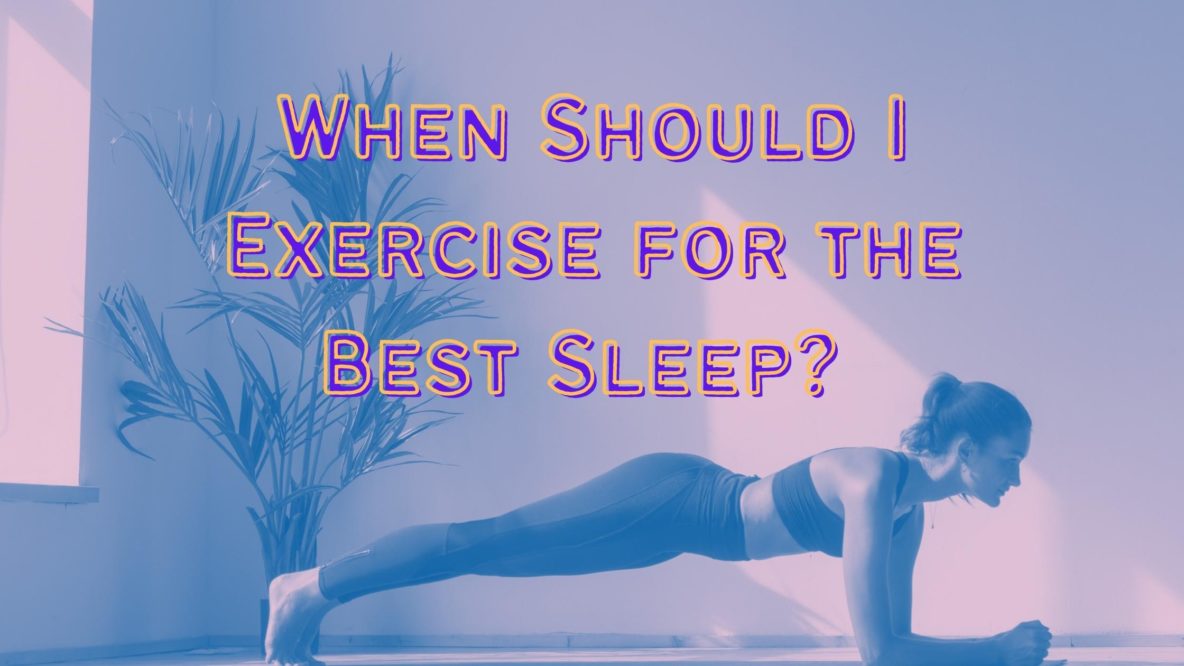When Should I Exercise for the Best Sleep

- A Promising Paradigm Shift: New Research Challenges the CPAP-First Approach to OSA Treatment - September 5, 2023
- Understanding Sleep Meditation Techniques - July 30, 2021
- How Online Learning Has Affected Sleep for Students - July 13, 2021
Have you been missing out on precious hours of sleep because you’re having a hard time falling asleep at night? Several factors can affect your sleep and make it harder to fall asleep and stay asleep. For example, your diet, your stress, and even the temperature of your room can all impact your sleep.
One possible explanation for all that tossing and turning at night is your exercise routine. Staying active is extremely important for your overall health as well as for your sleep. However, the time of day you exercise can actually make a big difference in the quality of your sleep.
Why Should You Exercise?
Staying active has a lot of great benefits, such as improving heart health, lowering blood pressure levels, and giving you more energy. Daily activity can also calm anxiety and help manage depression. Regular exercise also helps you sleep.
People who exercise for a few minutes per day a few days a week often fall asleep faster, spend more time sleeping, and improve their sleep quality. They can also reduce nighttime wakefulness and even insomnia.
Regular activity can also decrease symptoms of sleep apnea or other sleep disorders.
When Should You Exercise?
Have you recently started exercising and noticed a decrease in sleep quality? Exercise should improve sleep quality, not decrease it! A likely reason for your poor sleep is the time of day you’re exercising.
Researchers agree that for most people, exercising right before bed is a bad idea. Exercising in the evening is linked to difficulty falling asleep, more restlessness, and overall reduced quality of sleep.
How Evening Exercise Can Affect Sleep
As you wind down for the night and relax in the evening, your heart rate slows, your body temperature drops, and your brain waves start to slow down.
When you exercise, the opposite happens! For example, if you go for a run right before bed you may have trouble sleeping. When you exercise, your body temperature rises and your body releases endorphins, causing increased stimulation and activity in the brain. Both these factors increase your overall energy levels and make it very difficult to fall asleep if you’ve been working out at night.
What’s the Right Time of Day to Exercise?
There isn’t one specific time of day when everyone should exercise. Instead, you’ll need to find the time that works best for you. For optimal sleep, we recommend exercising anytime in the morning, afternoon, or early evening. Whether you’re an early bird or you want to work out after work, make sure you’re not exercising within two hours of bedtime.
If you struggle with insomnia, we recommend avoiding exercising at least three to four hours before going to bed.
Most health experts recommend that you get around 150 minutes of exercise every week. That’s about 30 minutes on 5 days of the week. This exercise doesn’t have to be strenuous. Get outside for a walk or do some stretching on days you don’t want an intense workout. As long as you get active, you can improve your sleep.
Morning Exercises
Some types of exercises are better to do earlier in the day. Schedule aerobic or resistance exercise for the morning. This includes running, weightlifting, or anything else that elevates your heart rate and gets your blood pumping. Doing these kinds of exercises earlier in the day can improve your energy levels during the day and improve your sleep at night.
Lighter exercise or stretching is a great addition to your evening routine. This can increase drowsiness, help you relax, and make it easier to fall asleep.
Evening Exercises
If you often wake up during the night, you can try doing some light aerobic exercise in the early evening. This can raise your body temperature early in the evening, and lower it towards bedtime, increasing the natural drop in temperature you experience before bed.
Sound Sleep Medical
These are a few tips on how to exercise for better sleep. But remember that everyone is different, and it might take time to find out what works best for you. For some expert advice, visit Sound Sleep Medical and find out more about exercise, sleep hygiene, and how you can get consistently good sleep every night.
